Key takeaways:
- Local business networking thrives on genuine connections, fostering collaboration and support within the community.
- Preparation is essential for successful networking events, enhancing confidence, reducing anxiety, and facilitating meaningful conversations.
- Setting clear, measurable goals helps assess the value of events and tailor them to the audience’s needs.
- Effective post-event follow-up, including personalized messages and sharing resources, can transform initial interactions into lasting relationships.
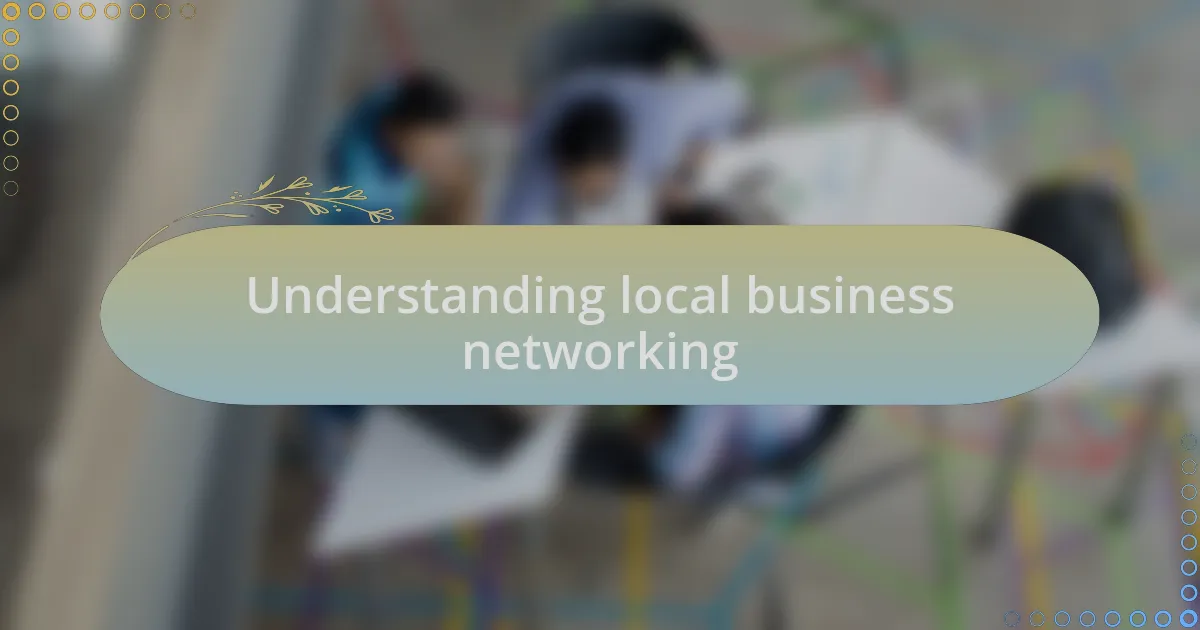
Understanding local business networking
Local business networking is all about building relationships that can lead to mutually beneficial opportunities. I remember attending my first networking event and feeling nervous, but the warm welcome from other attendees made all the difference. It struck me how genuine connections often spark collaboration, turning strangers into allies.
Understanding the dynamics of local business networking involves recognizing the importance of community. Have you ever thought about how powerful it is to be known in your own neighborhood? I’ve seen firsthand how supporting one another can lead to shared resources, referrals, and even joint ventures that wouldn’t have been possible alone.
The interactions that happen during local networking events can often reveal hidden gems of advice and insight. I once engaged in a deep conversation with a fellow business owner who shared invaluable strategies that transformed my approach to marketing. This experience solidified my belief that local networking can not only expand your market reach but also offer a support system that’s difficult to find elsewhere.
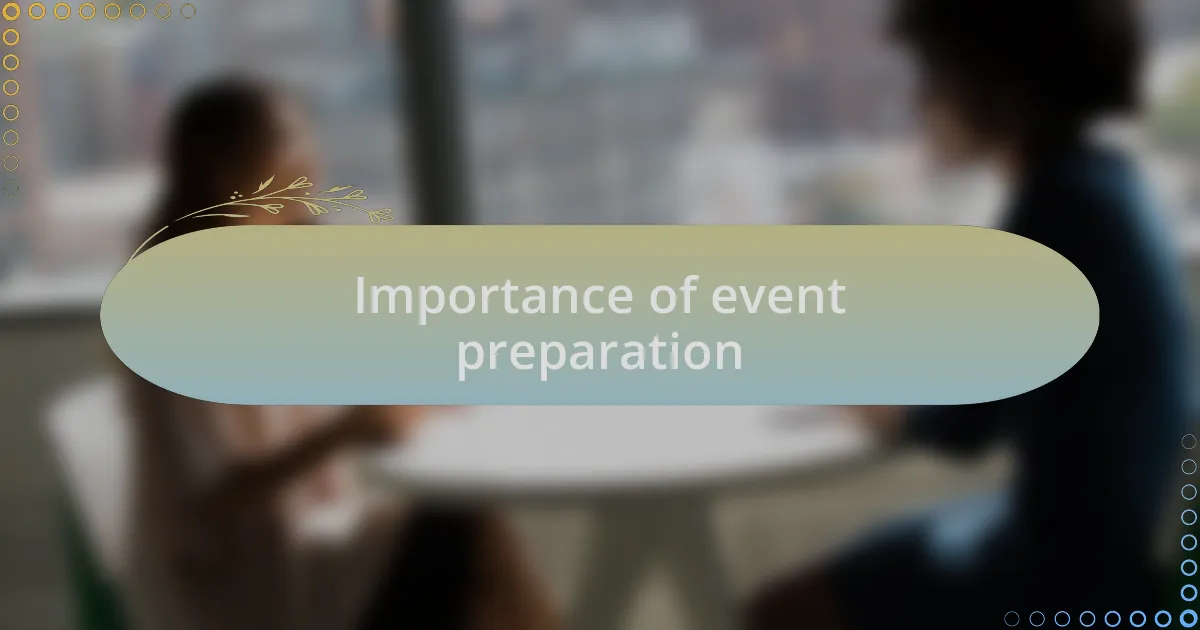
Importance of event preparation
Preparation for an event is often the cornerstone of its success. I remember one time I walked into a networking event without a solid plan, feeling overwhelmed and out of place. The discomfort of being unprepared taught me the value of knowing my goals, potential connections, and even practicing my introduction – these strategies can turn a daunting event into an opportunity for growth.
When I actively prepare for an event, it’s not just about logistics; it’s about mindset. I’ve found that by visualizing my goals and anticipating possible conversations, I approach these gatherings with confidence. Have you ever noticed how preparation can diffuse anxiety? It certainly has helped me discover new collaborations and friendships that I might have missed otherwise.
Another key aspect of event preparation is research. I once dedicated time to learn about the speakers and attendees before an event, and it transformed my experience. By having relevant questions and comments ready, I could engage meaningfully, which resulted in lasting connections. It’s clear to me that effective preparation doesn’t just enhance productivity; it can also enrich relationships, making every interaction more worthwhile.

Identifying networking opportunities
Identifying networking opportunities requires a blend of observation and intention. I remember walking into a local business fair and immediately scanning the room. It struck me how many valuable connections could be made simply by paying attention to who was talking to whom. Are you tuning in to the dynamics around you? I find that even casual conversations can lead to surprising collaborations if you’re looking closely enough.
In my experience, social media has become a powerful tool for identifying events worth attending, particularly within local communities. I often scroll through local business groups, where members share upcoming networking events. There was a time when I found an event through a friend’s post that I would have otherwise missed. It turned out to be a pivotal moment for my business; by staying alert online, I was able to seize opportunities right in my neighborhood.
There’s also something to be said about attending industry-specific gatherings. When I attended a seminar focused on my field last year, it became clear just how niche these events can be for fostering relevant connections. Recognizing that not all gatherings are created equal can help you invest your time wisely. Have you ever attended an event that simply felt like a mismatch? Understanding where your target audience congregates can save you from wasting energy and connect you with the right people.
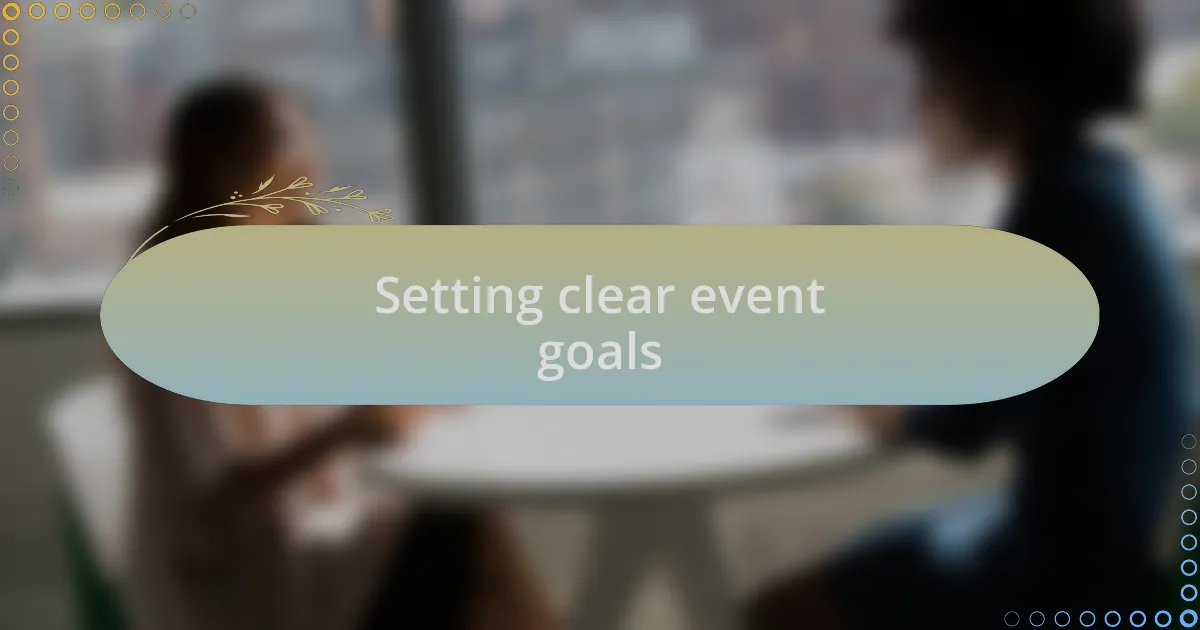
Setting clear event goals
Setting clear goals for your event is crucial in steering your planning and measuring success. I recall a time when I organized a small workshop and focused solely on broad objectives like “engagement” and “networking.” While those are important, I soon realized I needed specific targets, like generating ten new leads or facilitating three partnerships. With distinct goals, you can assess whether your event was truly impactful or simply another gathering.
When it comes to defining goals, it’s essential to consider your audience. For instance, if I know my attendees are local entrepreneurs eager for collaboration, I aim to create an environment conducive to brainstorming and sharing ideas. It wasn’t until I tailored my objectives to fit their needs that I saw an actual increase in participation and enthusiasm. Have you ever set out with one intention, only to find that what your audience wants is entirely different?
Setting measurable goals also keeps you accountable throughout the planning process. I remember a networking event that started as a vague idea but transformed into a focused initiative with concrete outcomes. By establishing specific metrics—like a set number of follow-ups or feedback forms filled out—I could not only boost my productivity but also create a more rewarding experience for attendees. Clear goals anchor your event strategy, turning visions into reality.
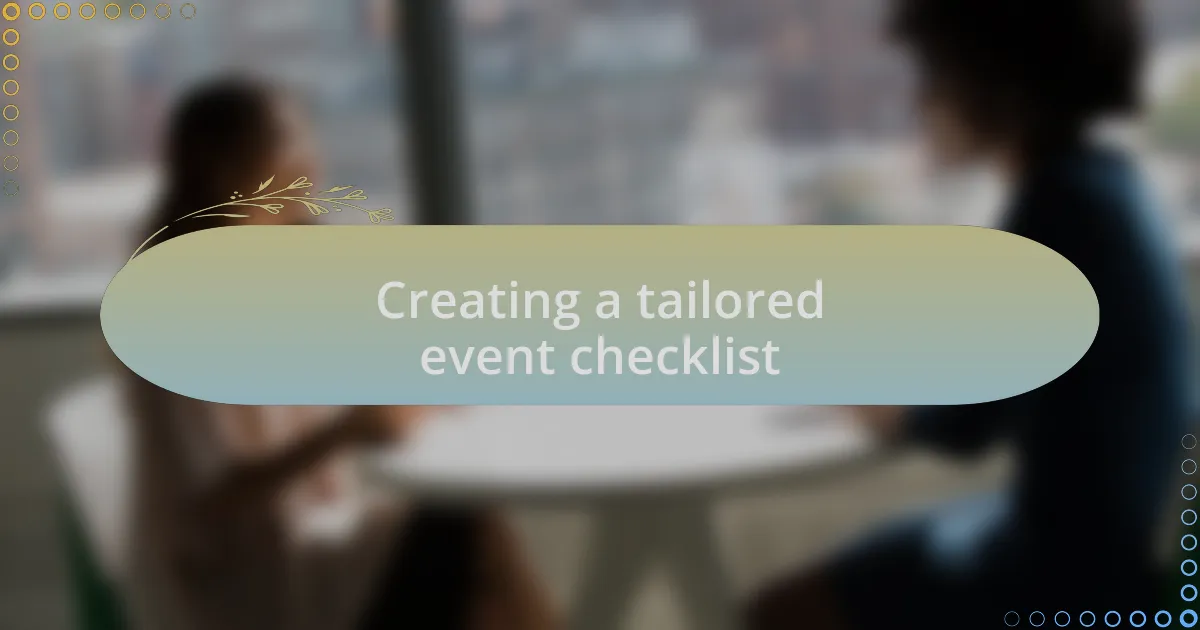
Creating a tailored event checklist
Creating a tailored event checklist is a game-changer for any planner. I’ve often found that writing down each task not only clears my mind but also keeps my focus sharp. For instance, when I once prepared for a local business expo, I divided my checklist into sections: logistics, marketing, and follow-up actions. This approach ensured that I didn’t overlook vital details amidst the hustle and bustle of preparation.
One of the most valuable lessons I learned was to customize my checklist based on the event’s unique needs. For example, if I was organizing a community workshop, I’d emphasize local partnerships and resource materials. Have you ever felt overwhelmed by the sheer number of tasks to manage? By creating a specialized checklist, I could streamline my efforts and prioritize what truly mattered, alleviating stress and allowing me to enjoy the process more.
I also believe that incorporating a timeline into the checklist elevates its effectiveness. In my experience, assigning deadlines to each task not only paces the preparation but also builds excitement for the event’s approach. I once set weekly goals for an upcoming seminar, which transformed what could have been a frantic scramble into a manageable and satisfying journey toward success. How do you approach time management in your event planning? Implementing this strategy has made all the difference for me, enabling me to create memorable experiences without losing my sanity.
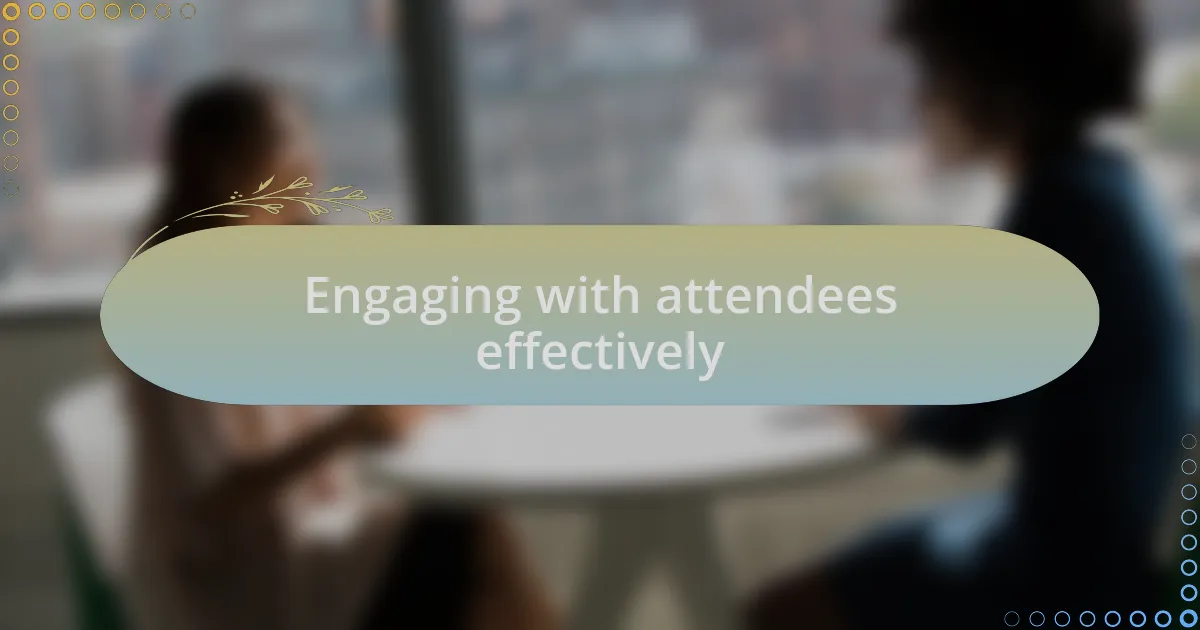
Engaging with attendees effectively
Engaging with attendees effectively starts well before the event kicks off. During my early days of event planning, I used to focus solely on logistics. However, I quickly realized that true connection happens through anticipation. For instance, I remember sending out personalized emails to registered participants ahead of a networking event, sharing insights on who was attending, and hinting at collaborative opportunities. The response was overwhelmingly positive, as attendees felt valued even before they arrived.
Another essential aspect is being present and approachable throughout the event. I recall a particular local business fair where I made it a point to mingle, actively listening and asking questions about each attendee’s journey. It not only sparked insightful conversations but also helped them feel acknowledged. Have you ever considered how a simple smile or a welcoming gesture can set the tone for meaningful dialogue? Engaging deeply with others fosters a sense of community, making your event memorable.
Post-event engagement is another key component that I’ve found crucial. Once, after a significant networking gathering, I sent out a follow-up survey and personalized thank-you notes to attendees. This not only solidified relationships but also provided invaluable feedback for future events. How often do you consider leveraging that post-event momentum? Maintaining connections can turn one-time participants into loyal advocates for your brand and future events.
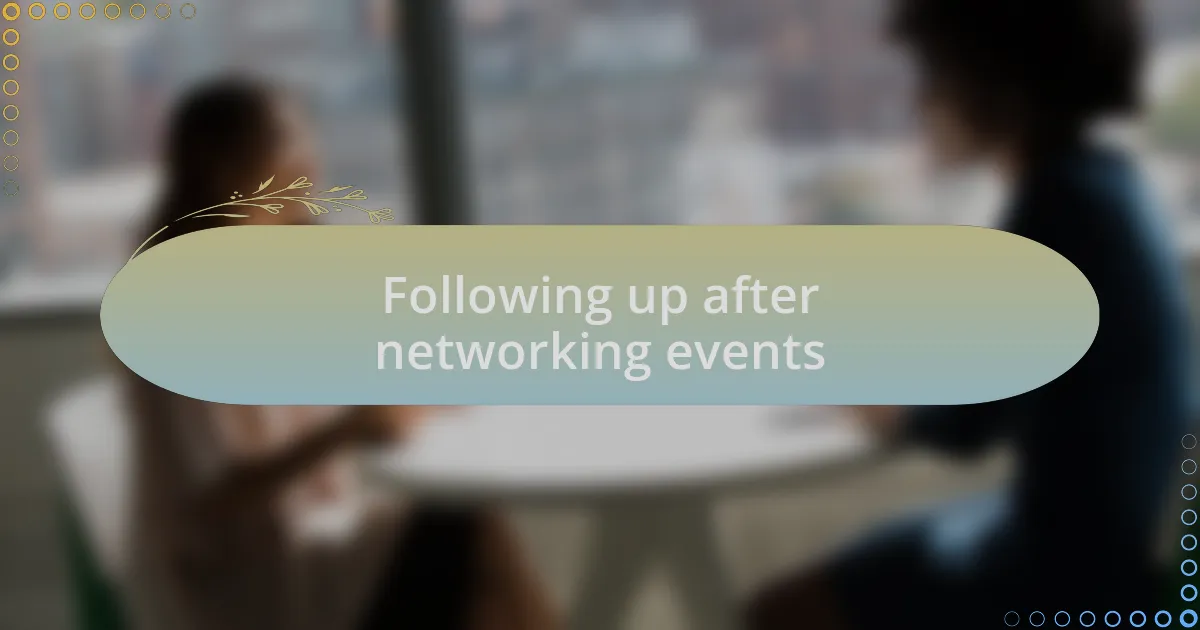
Following up after networking events
Following up after networking events is essential for building lasting relationships. I recall a time when I reached out to attendees with a brief message, reminding them of our conversation during the event. That simple gesture not only jogged their memory but also opened the door for further discussions. Have you ever noticed how a timely follow-up can turn a fleeting connection into a meaningful relationship?
I’ve found that personalized follow-ups can be incredibly effective. After one event, I took the time to reference individual topics we discussed, which sparked genuine interest and engagement. By tailoring my messages, I demonstrated that I truly valued our conversation. Isn’t it amazing how a little effort can make people feel seen and appreciated?
I also like to share relevant resources or articles in my follow-ups. After attending a business expo, I sent a curated list of helpful tools to a few contacts I made. They not only appreciated the information but responded with their own insights, creating a rich dialogue. Wouldn’t you agree that sharing knowledge can be a powerful catalyst for deeper connections?